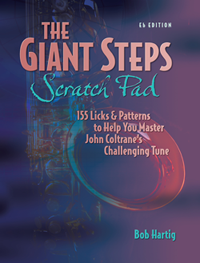There are two broad aspects of productive practice on the saxophone, or for that matter, on any musical instrument. Those aspects are the intellectual and the physical. The intellectual side involves figuring out what you’re doing and why. The physical part is pure muscle memory, a matter of developing technique. Your goal as a musician is to gradually and increasingly knit together both of those aspects into a seamless whole. For that matter, neither of the two exists apart from other, but there are times when you will find that you’re weighting one concern more heavily than the other.
In this post, I’ll address a critical component of successfully developing the physical side. It’s really no deep, dark secret, but it eluded me for a long time, and when I finally discovered it, my technique–and consequently my playing overall–took a quantum leap forward. So, Grasshopper, I now pass on to you the chops-building key of the ages. Make the following wisdom your practice mantra:
Repeat, repeat, repeat.
I repeat: REPEAT.
Whether it’s a simple scale pattern, a complex lick, or a digital exercise that you’re striving to run seamlessly through all twelve keys, repetition is the vehicle that moves the material you’re practicing from that first phase of slowly piecing it together under your fingers, to internalizing it in a way where you own it and can produce it at a moment’s notice.
What do I mean by “repeat”? Simple. You play your material–slowly enough to play it well. Then you play it again. And again. And again. And again, and again, and again…
You increase your speed gradually as the material works its way into your fingers. Ten times, fifteen times, twenty times…what you’re doing is programming your fingers. It’s the same principle as learning to type. The more you do it, the less you have to think about what you’re doing as muscle memory takes over, converting the intellectual aspect of what you’re practicing into automatic response.
Repetition is not some strange concept. It’s the norm. It’s what you do if you want to become proficient on your axe.
It takes time. Yes, time. That’s one reason why an hour is really nothing once you become truly immersed in practicing your instrument. Two hours is more realistic–and believe me, once you discover the magic of the woodshed, you can go much longer than that, and you’ll want to.
Repetition isn’t a magic bullet, but it’ll go a long way to developing the stuff you need in order to be a great improviser.
So I hope you don’t mind if I repeat myself one more time:
Repeat, repeat, repeat.
Now…tell me what I just said.
Very good, that’s right…
Repeat.

